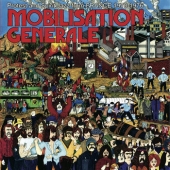
Various Artists
Mobilisation Generale - Protest And Spirit Jazz From France 1970-1976
Label: Born Bad
Genre: Jazz / Avant Garde
Availability
- CD Digi / Cardboard €14.49 Out of Stock
If the Stones, the Who, the Kinks or the MC5 compose the soundtrack of the revolution with Molotov singles, it is black Americans who blew up the dikes during the sixties. Against daddy's jazz and the Western tradition Ornette Coleman, Cecil Taylor, Eric Dolphy, Albert Ayler or Archie Shepp release the note, explode formats, embark on furious improvisations that redraw a territory without borders, as spiritual as political. With free jazz, the sax becomes a machine to destroy the established order.
The Art Ensemble of Chicago, which landed in Paris in 1969 at the Théâtre du Vieux Colombier, lit a new wick. The quintet integrates traditional linup a multiplicity of "small instruments" found everywhere (from the bicycle bell to wind chimes through the steel drum, djimbe or vibraphone: nothing escapes them) which they use according to their inspiration. On stage the group detonates by wearing boubous and war paintings to celebrate the powers of a free and hypnotic music, in direct connection with its African roots. The meeting with the Saravah label (founded in 1965 by Pierre Barouh), then at the forefront of a world music that does not yet name, is obvious. The album Comme à la radioby Brigitte Fontaine recorded in 1970 after a series of concerts given at the Théâtre du Vieux Colombier sealed the union of this heiress of a poetic and committed French song (Magny, Ferré, Barbara) with the jazz voodoo of the Art Ensemble of Chicago and the Arab tradition perpetuated by his companion Areski Belkacem.
A UFO has just landed on the decks of French teenagers who discover the underground culture via News, Liberation, Charlie Hebdo, Rock'n Folk and a free press in full boiling. A youth that is of all fights: alongside the peasants on the Larzac plateau, workers at the Lip factory, against nuclear power at Creys-Malville, the Vietnam war, the death penalty, the discrimination suffered by women, homosexuals and immigrants. Making music when you're 20 in the early 70s is politics. We do not take a microphone to become a rock star but to advance his ideas. While the price of the barrel ignites and that Pompidou concretes at all goes by developing the large sets and by "adapting the city to the automobile", one takes the road to take refuge in the countryside. Communities that are formed in the four corners of the hexagon are born groups (or rather groups) with variable geometry that blithely mix music, theatrical happening and acts prop under a good dose of acid. The big anything is often in order (the prog rock is the cream pie of the time), but those who take the path drawn by the spiritual jazz hover to other skies. The vehemence (see the grandiloquence) of the remarks is then carried and transcended by the delicacy and the inspiration of the game. France of Claude François never heard that. At once spatial, pastoral and tribal, the pieces gathered here make the perfect link between a certain psychedelic heritage, the space jazz of Sun Ra and the Afro Beat which is then set up in Lagos with Fela,
1978. Giscard is at the helm. Punk and disco decapitate the last hippies. If the blood is still boiling, it's already too late. The war is over, it has been lost without anyone noticing, and we can still fight against windmills, sometimes speak powder and lead in struggles without issues (from dream to nightmare there is only one step), we know that the enchanted parenthesis has just closed, that the tomorrows are now behind us and that we will leave only a few records for our children. The specter of a prophetic single can then resurface speakers. Brigitte Fontaine questions Areski: "Hey, but I'm thinking about something, we're not going to die in a minute? "
